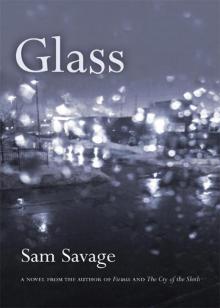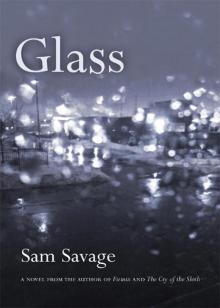- Home
- Sam Savage
The Cry of the Sloth
The Cry of the Sloth Read online
THE CRY OF THE SLOTH
THE CRY OF THE SLOTH
The Mostly Tragic Story of Andrew Whittaker
Being His Collected, Final,
and Absolutely Complete Writings
BY SAM SAVAGE
COFFEE HOUSE PRESS
MINNEAPOLIS :: 2009
COPYRIGHT © 2009 by Sam Savage
COVER AND BOOK DESIGN by Linda Strand Koutsky
COVER IMAGE © Jupiterimages
AUTHOR PHOTOGRAPH © William Baldwin
COFFEE HOUSE PRESS books are available to the trade through our primary distributor, Consortium Book Sales & Distribution, www.cbsd.com or (800) 283-3572. For personal orders, catalogs, or other information, write to: [email protected].
Coffee House Press is a nonprofit literary publishing house. Support from private foundations, corporate giving programs, government programs, and generous individuals helps make the publication of our books possible. We gratefully acknowledge their support in detail in the back of this book.
To you and our many readers around the world, we send our thanks for your continuing support.
LIBRARY OF CONGRESS CIP INFORMATION
Savage, Sam, 1940–
The cry of the sloth / by Sam Savage.
p. cm.
ISBN 978-1-56689-231-5 (alk. paper)
ISBN 978-1-56689-264-3 (ebook)
1. Middle-aged men—Fiction. 2. Authorship—Fiction.
3. Revenge—Fiction. 4. Psychological fiction. I. Title.
PS3619.A84C79 2009
PS813’.6—DC22
2009020904
1 3 5 7 9 8 6 4 2
What happens to us
either happens to everyone or only to us:
in the first instance it’s banal;
in the second it’s incomprehensible.
—FERNANDO PESSOA
JULY
Dear Mr. Fontini,
This is for the record. The sheetrocker has submitted his bill for replacing the ceiling in the kitchen. This was, as you are surely aware, a rather large piece of ceiling, more ceiling, in fact, than many people are unfortunate enough to have in their living rooms. Furthermore, this is the second time, which makes it cumulatively more difficult for me to assume the burden of payment. I am not a wellspring of funds—many people would vouch for that. In short, I cannot remit to the repair people funds in excess of $300 out of my pocket. I enclose a copy of the bill for your perusal. Please remit by the time of your next rent due.
Sincerely yours,
Andrew Whittaker,
The Whittaker Company
¶
Dear Jolie,
This is a smaller check than you expected, and that can’t be helped. Never mind what the separation agreement asserts, you know as well as I do the properties are not “income-generating assets.” Even at the time of your departure at least half of them were white elephants or worse, and they are now so heavily mortgaged, so deteriorated, they barely suffice to keep my small raft afloat while it is being tossed about on an ocean of shit, meager as it is and weighted with the barest of necessities. (I mean to say the raft is meager; the ocean of shit is, of course, boundless.) By “deteriorated” I mean falling apart. Mrs. Crumb attempted to open her bedroom window last week and it tumbled out into the street. She’s going to have to make do with plastic sheeting, and in the meantime I’ve had to knock twenty bucks off her rent. There are new vacancies every month, an unstaunchable hemorrhage. Two of the units off Airport Drive remain unrented despite all my work, even though I have ads running constantly. It’s ninety-seven degrees outside and I don’t dare turn on the air conditioner. The money I am sending now I have siphoned—“diverted” I think is the legal term—from the Repair and Maintenance Fund. You know perfectly well that scrimping there now will only serve to reduce revenues in the future. I recommend you think about that. If Todd Fender calls me I will hang up.
They’ve taken down the big elm tree across the street. It was the last elm on the block. After the sawyers left I went over and stood on the broad white stump and stared across at our house, in the sun and heat, without the mercy of shadows. I was struck by how uninteresting it looks.
The word seems to be out. People have stopped asking me about you and how I’m getting along. Instead, I get looks of silent commiseration, in which I bask. And when I walk, I swing my arms in a manner I take to be jaunty—that’s to confuse and confound them. In the old days I would have carried an ivory-pommeled cane and people seeing me would have said, “There goes that literary gent.” But now they say … Well, what do they say?
Affectionately,
Andy
¶
BIG AND COZY! 1730 Airport Drive. Duplex. Both units 2 bdrm 1 bath. Appliances. New paint and carpet. Spacious older-type bldg with many upgrades. Top unit has view of small pond. Centrally located minutes from bus line. $125 + utils.
¶
Dear Marcus,
I count on my fingers, can it really have been eleven years? We promised to keep in touch, and yet … I suppose even “out East” you now and then get wind of our doings back here in Rapid Falls. I for my part have needed only the Sunday supplement of our local Current to keep abreast of your career. (I chuckle aloud as I write this, remembering how “career” was once a dirty word to our little band of roughnecks; a chuckle tinged with melancholy). They once published a photo of you on your motorcycle. That was certainly a handsome machine; I never saw so much chrome. At the time I considered sending the picture on to you, but was prevented by the thought that you probably have a clipping service. Each time I see your name in print, dear Marcus, or catch a “rave review” of yet another novel, I experience a salience of warm pleasure at the spectacle of an old pal succeeding, a pleasure mingled, I confess, with a small measure of personal satisfaction. And why should it not be? It was I, after all, who led our little gang in those experiments that you and others, including the wily Willy, have honed to such perfection. I think of myself as the spark that lit the conflagration. It’s a pity the idea of directly importing movie characters into the novel has become so vitiated by practitioners of lesser talents than you. Must we count poor Willy among them? I fear for him.
But stay. I am not writing to talk old shop, nor indeed (if I may turn a phrase), to shop old gossip. I have a friend in need. Not a friend of flesh and blood, though I have those as well perforce. I allude to Soap: A Journal of the Arts, the little literary review of which I am founder and editor, with its annual supplements, Soap Express and The Best of Soap. I imagine you have heard talk of us in the smaller press, though you might not have been aware of my connection (I don’t blazon my name across the cover), and you might even have seen the mention in American Aspects a few years back, in a review of Troy Sokal’s Moon Light and Moon Dark, where they contrasted—favorably—Soap’s “neomodernist shibboleths” with the “murky enthusiasms” of Sokal’s “smut and manure movement.” Naturally they got almost everything wrong: there is no rivalry between Soap and Sokal, and S & M is a “movement” only in Sokal’s imagination. I did send you some early copies of the mag, which you did not acknowledge. Perhaps you never got them.
Permit me to lay out a few of our “firsts.” We were the first to publish Sarah Burkett’s harrowing travelogue The Toilets of Annapurna as well as excerpts from Rolf Keppel’s Zen novel Ball Bearings. Both were later republished by big New York houses to no small acclaim. I am sure you know the titles even if you have not read the books. (I am sorry to say that a reader would have to scrutinize the microscopic print on the copyright page to learn of our role in bringing those authors to light in the first place, both being basically smalltown nobodies and with manners that show it.) Miriam Wildercamp’s mirror poetry appeared r
egularly in our pages at a time when no one else would touch it. Our newest discovery is Dahlberg Stint, who I expect will soon be making waves coast to coast. All this in addition to my own stories, reviews, and occasional short poems. I have edited the mag practically singlehandedly for, lo, these seven years. During that time I have pushed hard against a deadening complacency, striving with Poundian fury to establish some minimal standards. I am proud to say that we now and then have managed to shake things up in a positive way.
But obviously an enterprise like Soap cannot survive on subscriptions alone. I have had to rob countless hours from my own writing and go about hat in hand in pursuit of public and private grants. It was never enough, and we have been able to survive only through handouts from my own personal funds. Jolie and I even held regular bake sales on the University Mall, and that worked well for a time, but since then I have lost her assistance, not just her baking skills but also her typing and bookkeeping. Two years ago she moved to New York, to Brooklyn, to study theater, even though she had never shown any interest in theater before. In the meantime relations with the local “arts people” have gone very sour, perhaps in part because I no longer have Jolie’s sparkling personality running interference for me. I do have a tendency, I fear, to speak my mind. But I think the root of the problem is that it has gradually dawned upon these people that I am not going to let Soap become a dumping ground for their mediocre productions. Things have come to such a pass that The Art News feels entitled to regularly mock the journal in their “Monthly Roundup,” referring to it as “Soup” and “Sap” and other imbecilic permutations, “Pus” and “Glop.” That alone should tell you what we are up against. I do sometimes envy you in New York.
With the economy what it is—and the apparent incapacity of the Nixon people to do anything about it—my personal income has shrunk, indeed it has shriveled, while expenses have swelled. Unless I take strong steps, Soap is going to become permanently derailed. And more bake sales are not going to cut it. Which, dear Marcus, brings me to the point of this all-too-rambling letter. I have something big in mind for next spring. Plans are still sketchy, but I see a kind of symposium cum retreat cum workshop cum writer’s colony sometime in April, just as the daffodils appear. The idea is to bring first-rate talents from around the region together with a paying audience for a weekend of workshops and lectures. As you know, the sort of people who attend these things are not usually terribly well informed about who is who in the literary world (most have probably never even heard of Chester Sill, or Mitsy Collingwood, who have both promised to be there), so it would be a tremendous boost to have at least one “national figure.” And I must say, after the brouhaha around The Secret Life of Echoes you are certainly that! So will you come? Along with a resounding “Yes,” I hope you will send along any bright ideas you might have for the program. Nothing is set in stone yet.
Your old pal,
Andrew Whittaker
p.s. I regret that neither the mag nor I will likely be able to pay you for your time or even reimburse travel expenses. I feel bad about that. You will, however, find commodious lodging at my house, and when the crowds have dwindled, some good company for late night talk. I know I’ll not scare you away when I say that I look forward to “taking the gloves off” in regard to some of your recent work.
¶
Disgusting, disgusting. Lying, sycophantic, stupid. The ingratiating phrases. How can I be so loathsome? What I need is a door I can walk through and get out of the world for a while. When I was a child I liked to hide in the big closet in my parents’ bedroom, curl up in the dark with the smell of mothballs and the feeling of sitting on the lumps that were Mama’s shoes.
¶
Dear Mrs. Brud,
Seven months, and I have had no rent payment from you. Twice I have sent courteous reminders. Those did not scold, neither did they speak of breach of contract or invoke harsh specters of legal action and ignominious eviction. In view of that you can picture my surprise when I opened your reply this morning and out fell no check or postal money order. What fluttered to the floor instead was your astonishing letter. Madame: permit me to recall the circumstance of our discussion when you came to my house five months ago, you being at the time two months in arrears. You were distressed, distraught even, and as I am not a Scrooge or heartless rack-renter, I did not leave you standing on the doorstep in the rain; I invited you in, offered you a seat. All chairs being occupied by my books and papers, we were forced to share the small portion of the sofa that was still free. You were wet and trembling with cold; I brought you a martini and some peanuts. I listened patiently to the story of your husband’s accident with the electric blender and the medical expenses arising from that, and your son’s wrongful arrest and the legal expenses arising from that. I was moved to utter the platitudes of sympathy usual in such cases. However, when I told you not to worry, it did not cross the purlieus of my mind that you would construe this as carte blanche to live rent-free forever. As to your current letter, I do not understand what you intend when you assert that if I insist on the back rent you will be “forced to tell my husband.” Tell him what? That the legal owner of the house in which you reside would like some meager imbursement? And what do you mean by the phrase “if you want to see me again.” What are you suggesting? You wept. You were sitting on my sofa. It was perfectly normal that I should find that distressing in the extreme. I held you in my arms as I would hold a weeping child. I muttered “there, there.” If I let myself stroke your head and sweep with ink-stained finger a sodden strand of graying hair from your lips—after you had, as it were, fallen over on me—it was without any (dare I say it?) sexual interest. I merely hoped those gestures would lend some credence to my words of sympathy, which will, should such an event recur in the future, I assure you, be entirely pro forma. Please remit 7 × 130 = $910.
Yours sincerely,
Andrew Whittaker
The Whittaker Company
¶
Dear Contributor,
Thank you for giving us the opportunity to read your work. After careful consideration, we have reluctantly concluded that it does not meet our needs at this time.
The Editors at Soap
¶
Dear Jolie,
Why did I never wonder about what was happening to Papa? There he was, blood pressure so high it made him bug-eyed, a malady of the skin on his back and buttocks so itchy he would stand in the kitchen and furiously scratch with a metal spatula until his shirt was streaked with blood, and a tendency to drink himself stuporous at supper. Mama would try to snatch the plate away the instant she saw him nodding, but sometimes he’d go face down in the meatloaf and potatoes or whatever she had fixed that night, applesauce and pork chops, before she could reach it, though more often he went off the chair sideways. It never even occurred to me that this sad comedy bore any relation to what he did all day, what he was forced to do all day. I just took it as the natural course of the man’s life. And now it’s happening to me. I mean that life is happening to me. One day I’m out dunning tenants for back rent, hearing their sob stories, listening glassy-eyed to the whine of complaints about stopped drains and unkillable mice and furnaces that won’t heat and ceilings that have fallen down. I’ll never understand these people. Do they strip to their underwear just for the purpose of answering the doorbell? Or is it so they can more ostentatiously scratch while I am speaking? Next day I am on the phone trying to wheedle some tradesman into working for credit. And then when I do find somebody, he screws the work up so badly I have to go back and do it over myself, even though I don’t know how, but at least I work cheap. How about that for my epitaph: He worked cheap. And then when the damn thing breaks again they call me up and threaten. I’ll end up carrying a pistol around with me like Papa. Then there are the big boys—the banks, the water works, the electric company, the phone company, especially the phone company. I have dreams in which I am pursued by men in armor. Sometimes I frighten myself with the thought th
at any minute I am going to descend howling into the street. Or maybe take Papa’s pistol, push calmly through the glass doors of some downtown office, and Bang! Bangety bang bang! Things go on like this for weeks at a time, until I’m utterly exhausted. No psoriasis yet, my head still floats bravely above my plate of fried Spam, but I’m depleted, drained, spent. When I finally get home, I have to lie down on the sofa, chest heaving as after some huge physical exertion. You might give me a call sometime.
Andy
¶
ENJOY A FAMILY LIFESTYLE! 73 Charles Court. Unique single-family bungalow-style house in desirable neighborhood. 2 bdrm 1 bath. Large closets. Security fence. Paved yard. Lighted parking. 10-min walk to shops and gas station. $155 + utils.
¶
Dear Mama,
I hope this letter finds you recovered. It’s true, colds can be very unpleasant, and it was not kind of Elaine to make fun of you or take away your Kleenex, if that is really what happened. And despite what you imply, I do know that hedges can be boring when they are all one has to look at. But I am convinced that if you look at them closely and try to see each leaf separately and not just as one among many, you will find them more varied than you thought and interesting enough to make your afternoons pass pleasantly by. I have always believed the reason people are bored is that they don’t pay attention to details. I had hoped to race up this month, but I am afraid the Chevy is once again on the fritz. There seems to be something wrong with the radiator, or the transmission, and with the terribly hot weather we’re having here it wants to “boil over” even on short trips to the Safeway. I asked Clara about your hair dryer; she says she doesn’t remember it. When I’m able to make it, I’ll take you out driving. We can scoot over to Woodhaven and visit Winston’s tomb; I know you enjoy that, and of course so do I. And by the way, it was unjust of you to say that I “never gave a tin shit” about Winston. In fact, I spoke to Reverend Studfish just last week. He promised he would look into the question, though he did warn me right off the bat that church law seems fairly canonical on the issue. However, I don’t think you should let that discourage you, as he never cared for Winston after what he did at Peg’s wedding, what he, Winston, did. If it is any comfort to you, I am personally convinced that Winston is happy where he is, wherever that might be.

 It Will End With Us
It Will End With Us The Cry of the Sloth
The Cry of the Sloth Glass
Glass An Orphanage of Dreams
An Orphanage of Dreams Firmin
Firmin Quantum Voices
Quantum Voices Glass (Small Press Distribution (All Titles))
Glass (Small Press Distribution (All Titles))